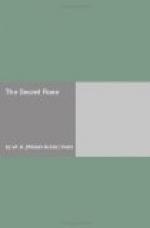W.B. YEATS
THE SECRET ROSE:
Dedication to A.E.
To the secret rose
the crucifixion of
the outcast
out of the rose
the wisdom of the
king
the heart of the
spring
the curse of the
fires and of the shadows
the old men of
the twilight
where there is nothing,
there is god
of Costello the proud,
of Oona the daughter of Dermott,
and of the
bitter tongue
As for living, our servants will do that for us. —Villiers de L’Isle Adam.
Helen, when she looked in her mirror, seeing the withered wrinkles made in her face by old age, wept, and wondered why she had twice been carried away.—Leonardo da Vinci.
My dear A.E.—I dedicate this book to you because, whether you think it well or ill written, you will sympathize with the sorrows and the ecstasies of its personages, perhaps even more than I do myself. Although I wrote these stories at different times and in different manners, and without any definite plan, they have but one subject, the war of spiritual with natural order; and how can I dedicate such a book to anyone but to you, the one poet of modern Ireland who has moulded a spiritual ecstasy into verse? My friends in Ireland sometimes ask me when I am going to write a really national poem or romance, and by a national poem or romance I understand them to mean a poem or romance founded upon some famous moment of Irish history, and built up out of the thoughts and feelings which move the greater number of patriotic Irishmen. I on the other hand believe that poetry and romance cannot be made by the most conscientious study of famous moments and of the thoughts and feelings of others, but only by looking into that little, infinite, faltering, eternal flame that we call ourselves. If a writer wishes to interest a certain people among whom he has grown up, or fancies he has a duty towards them, he may choose for the symbols of his art their legends, their history, their beliefs, their opinions, because he has a right to choose among things less than himself, but he cannot choose among the substances of art. So far, however, as this book is visionary it is Irish for Ireland, which is still predominantly Celtic, has preserved with some less excellent things a gift of vision, which has died out among more hurried and more successful nations: no shining candelabra have prevented us from looking into the darkness, and when one looks into the darkness there is always something there.




